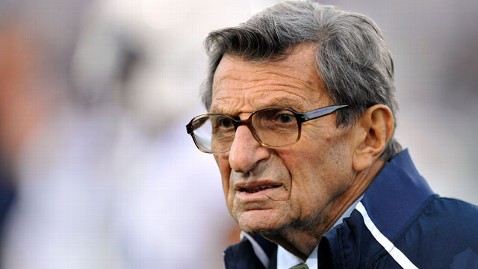Could Stress Have Spurred Joe Paterno's Rapid Demise?

Credit: Jim Prisching/AP Photo
Joe Paterno once said he'd die without football in his life. Now, only 74 days after he was fired as head football coach at Penn State University, where the beloved coach stood on the field for 62 seasons, Paterno has died of complications from lung cancer. Some experts say the stress brought on by the child sex allegations against Jerry Sandusky, Paterno's longtime assistant at Penn, last November could have sped up Paterno's demise.
"I believe stress can have a profound effect on one's overall health and outcomes," said Dr. Edward Kim, associate professor of thoracic head and neck oncology at MD Anderson Cancer Center. "My personal observations have been that those patients who have positive attitudes and understand their disease tend to do better overall."
When the Penn State child sex scandal in which Sandusky was accused of 40 counts of child molestation broke two months ago, many said Paterno could and should have done more to protect the boys whom Sandusky allegedly attacked.
After the incident hit headlines in November, Paterno said he was "absolutely devastated" by the allegations against Sandusky.
"It is one of the great sorrows of my life," he said. "With the benefit of hindsight, I wish I had done more."
Many have compared Paterno's death to that of Bear Bryant, the legendary University of Alabama football coach who died in 1983. When Bryant told reporters that he'd probably "croak in a week" after he retired, his words proved ominous when Bryant died of a massive heart attack four weeks later. Some said he died of a broken heart without football in his life.
"Mr. Paterno seemed to have a very grounded attitude about life," said Kim. "He was very loyal to football, Penn State and to himself. My thoughts are that once football ended, he felt a sense of conclusion to his life, and this certainly could have contributed to his overall condition. I have enormous respect for people who can delineate these items with practicality and dignity."
Nevertheless, Paterno's health was declining and lung cancer can be a ferocious disease. The harsh side effects of chemotherapy and radiation make it difficult to treat cancer patients over the age of 80, said experts. While age alone is not used to make cancer treatment decisions, elderly people are more likely to suffer from chronic illnesses that may make it difficult to tolerate the aggressive treatments.
"Even if Joe Paterno's will to live was not damaged by the scandal, the immense stress from the chaos in his life would have certainly weakened him in his fight against cancer," said Dr. Albert Levy, assistant professor of medicine at Mount Sinai School of Medicine in New York. "Chemotherapy is a harsh treatment method on its own. On an elderly 85-year-old person and someone debilitated emotionally, it would have an even greater impact on his prognosis."
Paterno's family announced that the former coach died of metastatic small cell carcinoma of the lung. Relatives decided to withdraw life support Sunday.
"Lung cancer is a devastating disease, and it is my hope that age of patients becomes less important," said Kim. "Through continued research and clinical trials, we hope to identity specific characteristics about individual patients in order to give them the best most effective therapy."